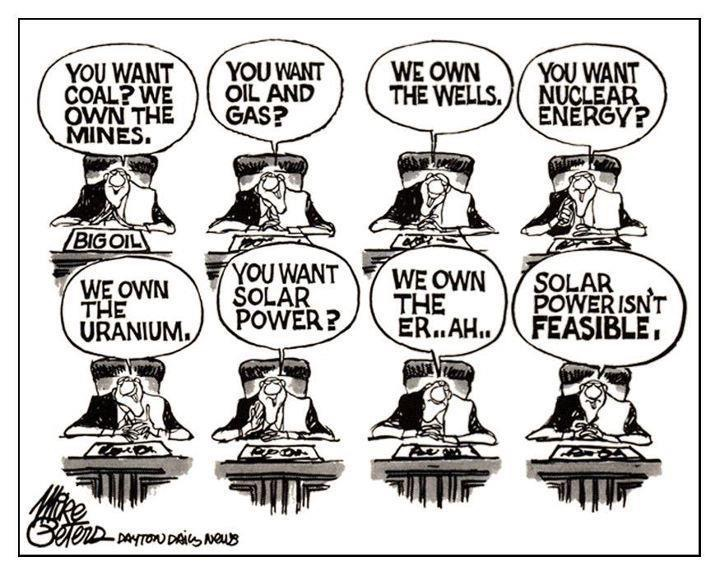This is a real problem but you can only have so many words in a tweet. Note that the price isn’t zero but instead negative. It means there is literally too much power in the grid and it would need to be used. If a grid has too much power then it is bad. It can damage it. There are things we can build that essentially amount to batteries (or natural variants like a dam) that get charged during times of higher supply than demand and discharged during times of higher demand than supply.
No but see you can’t build infrastructure to solve problems. What is this the 1700s? Go ride a train, commie!
Problems are only solved by grinding humans into a fine paste/powder, or destroying things for quarterly profits. Or doing a giant mountain of cocaine.
Yes, infra can be built, but not fast enough to keep up with all the solar panels being installed. For example: In the Netherlands our network can’t keep up with the requests being put out by companies, and we’ve already been busy for the last 5-ish years to install new infra, but that shit can take over 10 (!!!) years before a large line has been added. Land needs to be bought, people need to be informed, plans need to be made or adjusted, local companies need to be hired, the materials bought in and build into new pylons, etc.
It’s a MASSIVE undertaking. Even if you talk on a local level, where “The Last Mile” is the time-consuming problem there.
Shit takes time.
What infra? Youre acting like its a single thing. Sure pumped hydro takes a while. Even small scale, water towers on buildings. Sure.
But build a metal smelting thing. Take a crack at fusion. Use crypto mining techniques to tap cables and install massive racks of computers to do comedic deep fake smut of fascist politicians. Basically all meta-capacity can be applied to this, and some of it is really fucking portable.
What infra?
Sorry, I should’ve been explicit that I meant the power grid. You can generate all you want, but if the power grid can’t handle it, you’re shit out of luck :)
I saw some context for this, and the short of it is that headline writers want you to hate click on articles.
What the article is actually about is that there’s tons of solar panels now but not enough infrastructure to effectively limit/store/use the power at peak production, and the extra energy in the grid can cause damage. Damage to the extent of people being without power for months.
California had a tax incentive program for solar panels, but not batteries, and because batteries are expensive, they’re in a situation now where so many people put panels on their houses but no batteries to store excess power that they can’t store the power when it surpasses demand, so the state is literally paying companies to run their industrial stoves and stuff just to burn off the excess power to keep the grid from being destroyed.
Lol
I just love when large organizations (governments included) skimp on something for monetary reasons, and get fucked down the line.
Too bad citizens pay the damages.
Wish there was just a faster way to get citizen input.
“Hey folks, this is going to be a cost overrun for this very very good reason, please vote yay or nay in the weekly election”.
Don’t see how it could work now though, given that half the citizens are deeply committed to destroying everything to prove gov doesn’t work.
That’s not what I got from the article. (Link for anyone who wants to check it out.)
My interpretation was that decreasing solar/wind electricity prices slows the adoption of renewables, as it becomes increasingly unlikely that you will fully recoup your initial investment over the lifetime of the panel/turbine.
In my mind, this will likely lead to either (a) renewable energy being (nearly) free to use and exclusively state-funded, or (b) state-regulated price fixing of renewable energy.
Remember what Conservatives said about “not enough power”? I think that might be a lie
If the excess energy cannot be stored, it should be used for something energy intensive like desalination or carbon capture.
Heck pumping water uphill for all I care. The more potential energy the better.
Many places actually do pump water uphill into reservoir lakes for hydroelectric dams. In that case it is a form of energy storage, a literal water battery.
Unfortunately, it’s not always a feasible option. For instance, in the great planes there’s not much of an uphill to pump the water to.
I’ve seen some interesting ideas from Low Tech Magazine - one that I found particularly interesting was flywheel energy storage. Take a heavy disk or drum and spin it up with excess electricity, then discharge the spin from the battery when the Sun goes down.
Well, you have to handle excess power produced, you can’t just dump it on the ground.
If the grid produces too much power in excess of what’s being consumed, parts of it need to shutdown to prevent damage.
That’s why the price can go negative. They’ll actively pay you to use the power so they don’t have to hit emergency shutdowns.
As we build more solar plants, the problem gets exacerbated since all the solar plants produce power at the same time until it’s in excess of what anyone needs. Unlimited free power isn’t very helpful if when it’s producing it’s producing so much that it has to be cut from the grid, and when demand rises it’s not producing and they have to spin up gas turbines.
That’s before the money part of it, where people don’t want to spend a million dollars to make a plant that they need to pay people to use power from.
https://www.technologyreview.com/2021/07/14/1028461/solar-value-deflation-california-climate-change/
They go on to talk about how getting consumption to be shifted to those high production times can help, as can building power storage systems or just ways to better share power with places further away.
Government should invest in more energy storage so the excess can be used later, like at night
That and incentivise smart devices like water heaters that run when power is cheap, which is effectively a rudimentary battery

We own the factories building the panels.
Solar cells don’t really grow on trees.
Solar cells don’t really grow on trees.

Are you talking about
A scalable self replicating and self sustaining carbon capture technology that uses a mix of highly specialized biological processes to turn CO2 into engineering grade composite construction material, fuel and fertilizer.
?
You can’t earn the big money with it, so the capitalism isn’t interested. Planting a tree is almost for free. Maybe if we could file a patent on trees or something like that. Let’s ask Nestlé how they did it with water
There is never surplus power with a network of a few “turn it on as needed” intensive industrial uses like haber-bosch reactors for ammonia, dessalination plants and electrolysis for aluminium or other metals…right?
To be fair, having a mismatch between when energy is available and when it is needed is going to be a problem under any economic system, since it’s a fundamental inefficiency that must be worked around with additional effort and resources











